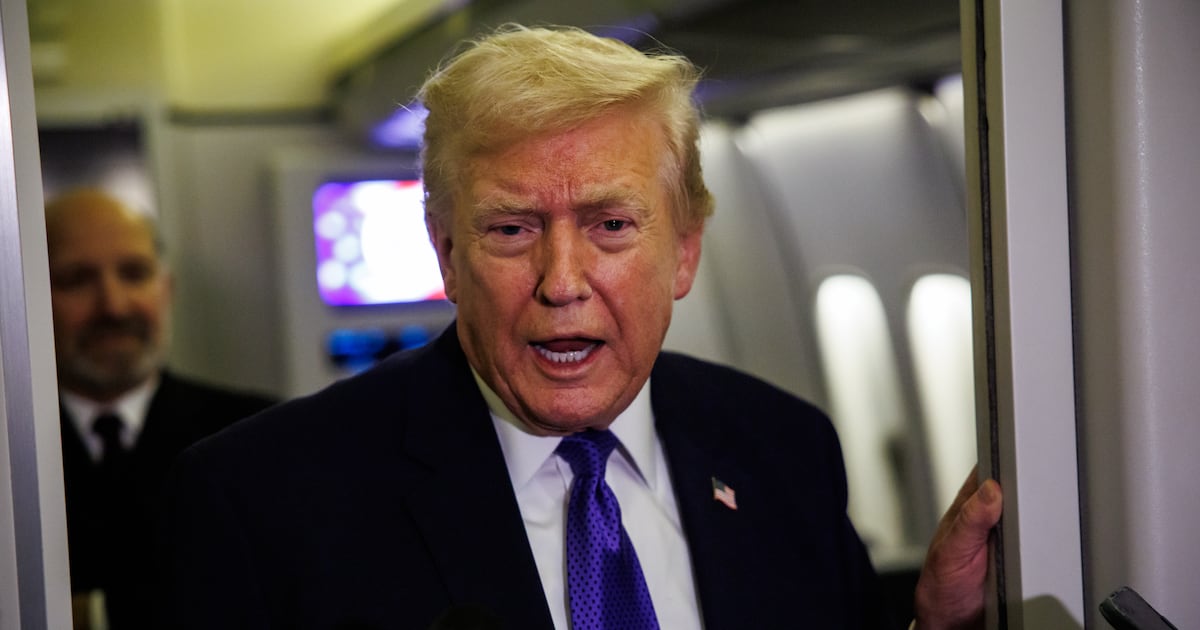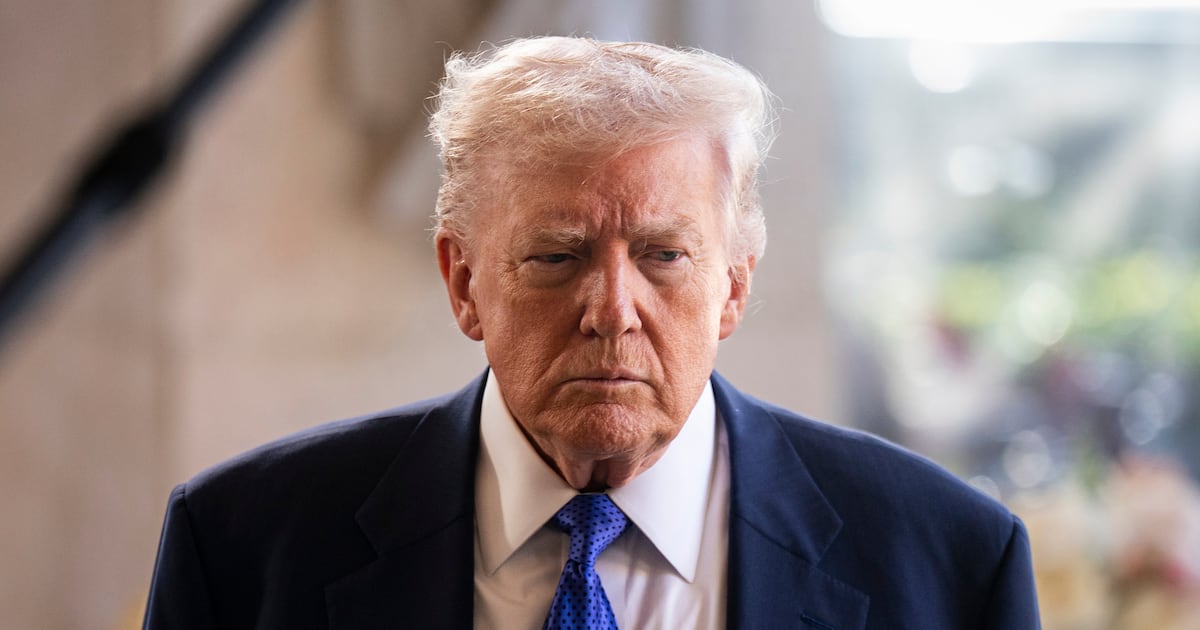With the FBI’s raid of Mar-a-Lago this week, former President Donald Trump is at one of his lowest moments since he left office.
After fighting off a subpoena for half a year, Trump was finally forced to testify on Wednesday at a closed-door deposition with New York Attorney General Letitia James over allegations of bank and insurance fraud at his family company—a civil case which could force it to close shop.
He pleaded the Fifth, still a self-incriminating tactic for a man who, during his 2016 presidential campaign, once declared: “If you’re innocent, why are you taking the Fifth Amendment?” While the move may spare him of criminal liability, it will only bolster the AG’s case in civil court, where staying silent can legally be perceived as damning evidence of its own.
The prospect of another long and damaging trial is also hanging over the Trump Organization and the ex-president’s former right-hand money man, Allen Weisselberg. According to Duncan Levin, an attorney representing a witness in that case, prosecutors with the Manhattan District Attorney’s Office are currently preparing eyewitness testimony for an upcoming criminal trial over the company’s scheme to dodge taxes on personal perks.
Weisselberg will be in court on Friday.
The Fulton County district attorney is also ramping up her investigation of Trump’s menacing phone call to the top elections official in Georgia last year, with a special purpose grand jury that is dragging witnesses behind closed doors in preparation for an official report that could pave the way to a criminal indictment for violating state laws.
Trump campaign lawyer Rudy Giuliani will be there next Wednesday, according to a source familiar.
The House’s Jan. 6 Committee is also continuing its investigation, after already documenting how Trump tried to subvert the American democratic system and remain in power. The committee has fired warning shots at Trump himself for engaging in what could be described as witness tampering, threatening to refer him to the Justice Department because he allegedly reached out to at least one former staffer before their congressional testimony. And members are expertly making the case to the public that Trump obstructed an official proceeding of Congress.
The widely watched hearings resume next month.
On Tuesday, after losing a bitter legal fight with a pissed-off staffer, Trump’s 2016 campaign revealed in court documents that it has been notifying ex-employees that they are freed from their once-ironclad nondisclosure agreements.
They’re now free to dish about any of Trump’s misdeeds.
An appellate court also ruled on Tuesday that the House Ways and Means Committee is entitled to review Trump’s tax returns—the crown jewels that Democrats have been seeking for half a decade to prove that the billionaire has always lied about his wealth, assets, and how much he pays in taxes.
Trump’s taxes might soon get their own congressional hearings.
And then there is the most threatening development of all: the sudden appearance of FBI agents at Trump’s Palm Beach mansion. More than two days later, the raid is still shrouded in mystery, mostly because Trump won’t reveal details about the warrant his lawyers were given.
In fairness, what little is known about the visit has mostly come from the breathless statement Trump made on his internet social media network, TruthSocial.
“These are dark times for our Nation, as my beautiful home, Mar-a-Lago in Palm Beach, Florida, is currently under siege, raided, and occupied by a large group of FBI agents,” his account posted Monday evening. “After working and cooperating with the relevant government agencies, this unannounced raid on my home was not necessary or appropriate… they even broke into my safe!”
Several legal scholars told The Daily Beast there was no chance anyone outside a small DOJ team had seen the lead FBI agent’s sworn affidavit supporting the application for a search warrant, which would detail exactly why authorities were there. But the warrant itself would at least provide some clues as to why the FBI came knocking—as well as what potential crimes Trump may be charged with.
Anonymous sources told several news outlets the raid was part of an ongoing investigation into Trump’s unauthorized removal of classified documents from the White House and relocation to his private home in South Florida—a clear violation of the Presidential Records Act. That law was itself put in place after former President Richard Nixon, who had already resigned, inappropriately kept a ton of records that would have further harmed his already miserable reputation.
Even a local law enforcement agency was kept in the dark about the Mar-a-Lago raid. The Palm Beach Police Department said in a statement it “was not aware of the existence of a search warrant nor did [it] assist the FBI in the execution.”
“The Palm Beach Police Department continues to maintain a good relationship with the FBI; however, we are disappointed by their lack of communication regarding this incident,” Major John Scanlan wrote to The Daily Beast.
The other agency in the area, the Palm Beach County Sheriff’s Office, told The Daily Beast it “was not involved.”
According to three sources, one of the lead defense lawyers representing Trump in the criminal investigation matter that led to the FBI raid is Evan Corcoran, an attorney who recently represented right-wing media personality Steve Bannon at his trial for defying a congressional subpoena and remaining loyal to Trump. One attorney briefed on the matter said Corcoran had been in talks with the DOJ for at least two months before the raid, discussing the location of classified and sensitive material that remained at Mar-a-Lago—at one point in a locked storage basement room.
Three attorneys told The Daily Beast that the unannounced FBI raid put a target on Corcoran’s back because any sudden door knock by federal agents reflects a breakdown in negotiations between prosecutors and defense lawyers.
“That’s what the Justice Department will use it for: to get rid of a lawyer, to create distrust between a client and their lawyer,” said Alan Dershowitz, a legal scholar who served on Trump’s defense team during his first impeachment trial.
A person’s lawyers try to convince prosecutors not to indict and will hand over documents and evidence to ease the process and not stoke the fire. But when those talks don’t seem to go anywhere—or when there’s a risk that evidence will be destroyed—law enforcement kicks into action.
“It's not unusual for DOJ to try to reach out and get as much dialogue as possible,” said Kendall Coffey, a Miami lawyer who served as the region’s top federal prosecutor in the 1990s. “But if DOJ has at some level decided there is going to be a search, they are not going to tell the attorney for the subject of the search.”
“A search warrant—while you are in discussions—signals significant adversity,” he said. “Prosecutors can be cordial and polite, even when they're planning to indict your client.”
Dershowitz, who criticized the FBI’s historic move as “hard to justify,” said Trump’s criminal defense lawyers should have been more combative and attempted to loudly and publicly halt the search.
“He has to be very aggressive, and he has to go to court, and he has to not trust negotiations with the Justice Department. He has to seek injunctions. He has to seek to have a special master appointed to look at the docs,” Dershowitz told The Daily Beast on Tuesday. “There should have been a lawyer in front of a judge at 10 a.m. yesterday.”
The danger to Trump personally is severe. Violating the Presidential Records Act, a little-known and seldom cited law, comes with the implausible risk of prison time but the very real threat of barring him from ever being elected again.
Anyone who willfully conceals, removes, or destroys any presidential records—or even attempts to do so—is “disqualified from holding any office under the United States.”
John W. Carlin, who led the National Archives for a decade during the Clinton and Bush II administrations, said the Justice Department was right to become “much more aggressive.”
“I would be shocked if they were nonconsequential classified records. There’s a reason why those boxes were taken,” he said of the raid at Mar-a-Lago.
“We’re talking about national security. We’re talking about protecting records that should not be routinely available to the public. Period. Classified records are very strictly managed. As Archivist, even I couldn’t just walk in and see classified records at a spur-of-the-moment,” he said.
Carlin said that even at the White House presidents are required to carefully handle documents with sensitive information.
“Just because you sit behind the [Resolute] desk doesn't mean you can casually have classified records sitting around the Oval Office. That's just not the way they’re handled,” he said.
Much less when you’re a former president sitting behind a faux Resolute desk at a private club.
“Casually taking two or three boxes from the White House with no permission… there’s no way that’s right,” Carlin said.
The next phase of Trump’s troubles depend entirely on what he does next.
His reluctance to immediately make public a copy of the search warrant his team received may spare him embarrassing details in the short term, but it has prompted The New York Times to sue for access to it. If that lawsuit succeeds in convincing a South Florida federal judge to unseal the warrant, Trump will be pressured to publicly explain what he was doing in possession of those sensitive government materials.
Meanwhile, his unrelenting attacks on those who authorized and conducted Monday’s FBI search are galvanizing his most rabid supporters, who have started openly discussing violent action against, among others, the magistrate judge believed to have signed off on the warrant application.
According to Vice, a right-wing forum dedicated to Trump—formerly hosted on Reddit and now on an independent website—has become a hub for Trumpists to publicly post the magistrate judge’s contact information and personal details. The threat was real enough that the U.S. District Court for the Southern District of Florida has taken down Magistrate Judge Bruce E. Reinhart’s official webpage.












